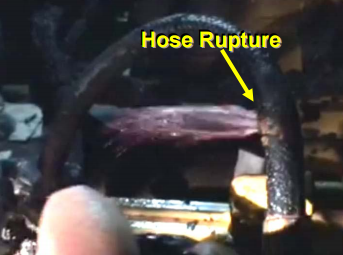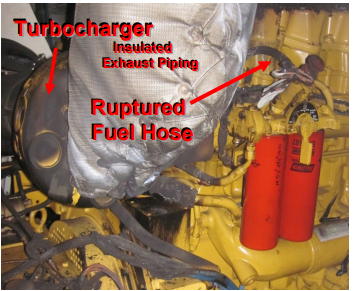Fuel spray fire – Déjà vu: Prepare and prevent it from happening to you!
The United States Coast Guard (USCG) has published Marine Safety Alert 06-17 to bring attention to ‘yet another fuel spray fire’. The USCG notes that “these types of incidents, involving fuel leakages contacting hot surfaces and igniting, happen too frequently and have been a focus of various marine safety organizations such as the IMO for many years.”
What happened?
On a 194 GRT offshore supply vessel with an unmanned engine room, a main engine low fuel pressure alarm occurred on the bridge, and was investigated by the crew.
The crew member on watch entered the engine room and identified a high-pressure fuel leak spraying over and upon the port engine’s turbocharger. He also reported a large quantity of diesel fuel in the bilge.
The Master then went down into the engine room and witnessed the ignition of the fire. Using a hand held portable fire extinguisher he quickly attempted to extinguish the fire without success. The Master activated the general alarm, secured the hatches, had crew members secure the ventilation dampers and closed the remote fuel shut-off valves to the engine room. The fire then quickly self-extinguished. No-one was harmed, but this engine room fire led to significant damage, operational down-time of the vessel and lost company revenues.


What went wrong? What were the causes?
The source of the fuel leak was identified to be a rupture on a flexible fuel hose connected to the fuel filter assembly. The USCG recommendations can be summarised thus:
- Avoid an “out of sight, out of mind mentality” and regularly inspect unmanned machinery spaces;
- Inspect fuel and lubricating systems closely from source tanks to system end points;
- Examine all heat sources particularly with respect to engine exhausts;
- Minimize the use of non-metallic flexible hoses in systems carrying flammable liquids particularly around engine areas where failures leading to leakage or spray may find hot spots capable of igniting the fluids;
Please refer to the fuller report and recommendations on the USCG website.
Members may wish to review the following incidents:
Safety Event
Published: 27 June 2017
Download: IMCA SF 16/17
IMCA Safety Flashes
Submit a Report
IMCA Safety Flashes summarise key safety matters and incidents, allowing lessons to be more easily learnt for the benefit of all. The effectiveness of the IMCA Safety Flash system depends on Members sharing information and so avoiding repeat incidents. Please consider adding safetyreports@imca-int.com to your internal distribution list for safety alerts or manually submitting information on incidents you consider may be relevant. All information is anonymised or sanitised, as appropriate.
IMCA’s store terms and conditions (https://www.imca-int.com/legal-notices/terms/) apply to all downloads from IMCA’s website, including this document.
IMCA makes every effort to ensure the accuracy and reliability of the data contained in the documents it publishes, but IMCA shall not be liable for any guidance and/or recommendation and/or statement herein contained. The information contained in this document does not fulfil or replace any individual’s or Member's legal, regulatory or other duties or obligations in respect of their operations. Individuals and Members remain solely responsible for the safe, lawful and proper conduct of their operations.
